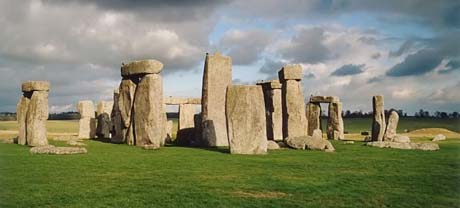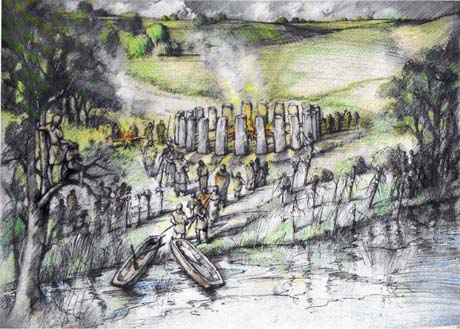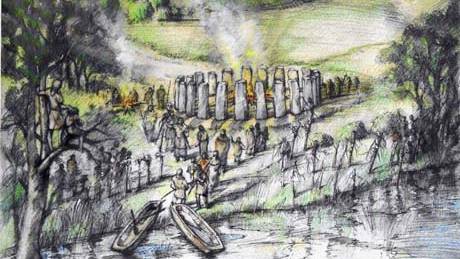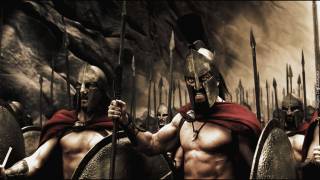Stonehenge could be part of massive funeral complex
Source: pantagraph.com

The discovery of a small prehistoric circle of stones near Stonehenge may confirm the theory that the famous monument in southwest England was part of a massive funeral complex built around a river, researchers said Tuesday.
The new find shows that the second stone circle -- dubbed "Bluehenge" because it was built with bluestones -- once stood next to the River Avon about 1.75 miles (2.8 kilometers) from Stonehenge.

This is an artist's impression of the Blue Stonehenge in western England. The drawing shows how scientists believe the “Blue Stonehenge” discovered by a team of archaeologists on the west bank of the River Avon in September 2009 may have looked. Researchers say a new find near the famous Stonehenge monument shows the religious significance of the site. The smaller prehistoric site is being called "Bluehenge" because of the color of the stones that were placed there thousands of years ago but have since disappeared. All that is left are the holes made when the stones were put in place. Researchers believe the newly discovered stone circle and the larger Stonehenge circle may mark a "domain of the dead" that was linked to the "domain of the living" by the River Avon. Experts say the stones were incorporated into the circle in about 2,500 B.C. AP Photo/ Peter Dunn/University of Manchester)
The find last month could help prove that the Avon linked a "domain of the dead" - made up of Stonehenge and Bluehenge - with an upstream "domain of the living" known as Durrington Wells, a monument where extensive signs of feasting and other human activity were found, said Professor Julian Thomas, co-director of the Stonehenge Riverside Project.
Project director Mike Parker Pearson said it is possible that Bluehenge was the starting point of a processional walk that began at the river and ended at Stonehenge, the site of a large prehistoric cemetery.
"Not many people know that Stonehenge was Britain's largest burial ground at that time," he said. "Maybe the bluestone circle is where people were cremated before their ashes were buried at Stonehenge itself."
There were very few signs of human life found around Stonehenge and Bluehenge, researchers said, lending credence to the idea that it was used as a funeral site, especially since there were signs that many human beings were cremated there.
A five-university team has been excavating the greater Stonehenge site since 2003 in a bid to unravel its meaning and use.
"This find certainly confirms the idea we've put forward that the river is of fundamental importance and links everything," Thomas said. "Everything is related to the river. That suggests that even before Neolithic time it may have had spiritual or religious significance. This find enhances the idea that all the monuments in this landscape are linked in various ways."
Researchers did not find the actual stones used to mark the smaller circle found by the river, but they did find holes left behind when the stones were removed.
The scientists believe the massive stones used for Bluehenge were dragged from the Welsh mountains roughly 150 miles (240 kilometers) away. There were clear indications that the gigantic stones from the Bluehenge site were later removed whole for use in the construction of Stonehenge, Thomas said.
They hope to use radiocarbon dating techniques to better pinpoint construction dates.
Article from: Pantagraph.com
Gary Biltcliffe - The Legacy of the Etruscans & The Mysterious Pelasgi
Gary Biltcliffe - The Spirit of Portland & The Spine of Albion (Subscription)
Cort Lindahl - Geomantic Information Systems
Daniel Tatman - The Bath Mystery's: Geomancy, Lay Lines & Organic/Fractal Architecture
Dan Winter - Fractal Geometry & The Golden Mean
David Flynn - The Giant's Geoglyphs of Tiahuanaco
Michael Tsarion - Irish Origins Part 1 - The West to East Movement of Civilization, Land Bridges & Age of Catastrophe
Dan Winter - Fractal Geometry & The Golden Mean
Freeman - The Esoteric Adventures of Freeman
Rik Clay’s interviews on Red Ice Creations – All Four Segments
Frank Albo - Freemasonry & Western Hermeticism
Lon Milo Duquette - Aleister Crowley, O.T.O. & The Thoth Tarot Deck
John Anthony West - Ancient Egypt
Hugh Montgomery - The God-Kings: Babylon, Ulvungar & Oden
Adrian Gilbert - The Orion Mystery & The Invisible College






















